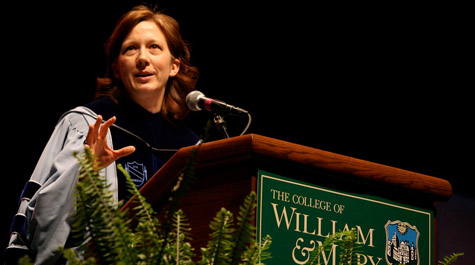Charter Day crowd welcomes Cantor J.D. '88, new traditions
Entrepreneurship is part of what makes America great, and it is critical to the continued success of the country, Congressman Eric Cantor J.D. '88 said at William & Mary’s annual Charter Day ceremony Feb. 4.
“If we lose the next generation of entrepreneurs and their hunger to innovate, we lose the future for the students at William & Mary and other institutions of learning around the country. It’s that simple,” he said. “And that’s why all of us, of any political or philosophical persuasion, must work together and do everything in our power to help these students ensure a brighter future.”
Cantor, the first William & Mary alumnus to serve as U.S. House of Representatives Majority Leader, spoke to a crowd of more than 2,000 students, faculty, staff, alumni and community members who gathered for the annual ceremony in William & Mary Hall Friday afternoon.
{{youtube:medium:left|jRVyoVrvAy4}}
Previously held on Saturday mornings in the smaller Phi Beta Kappa Hall, the new venue and day allowed more people to attend the event, which marks the day on which the College received its royal charter.
“It turns out that Saturday mornings are non-congenial times for our students to be up and about,” joked President Taylor Reveley at the beginning of the ceremony. “We can either ignore that reality or deal with it.”
New birthday traditions
Last year, the school began revamping the tradition, recasting it as a birthday celebration for the College in an effort to encourage student participation.
In addition to a new time and place, the ceremony included a few other new facets. The event began with a video, produced by the Office of Creative Services, which reflected on the College’s 318-year history while also giving a few playful winks to some of the College’s inside jokes, including its squirrel population.
{{youtube:medium:left|lMxDtL8ceI8}}
Also new this year, eight students – undergraduates and graduates – read excerpts from the royal charter. In years past, the provost read the entire charter.
New traditions also made their way to the Jefferson and Monroe award presentations, named for two of the College’s most famous alumni. This year, people who knew the awardees personally gave brief introductions before Rector Henry C. Wolf bestowed the awards. Additionally, the Jefferson awardees were each presented with a nickel, a tradition begun several years ago by students who used the coin, which bears Jefferson’s likeness, to subtly let professors know they had won a Jefferson Award before an official announcement was made. This year, William & May Law Professor Jayne Barnard received the Thomas Jefferson Award, and Associate Professor of Chemistry Elizabeth Harbron received the Thomas Jefferson Teaching Award. Harry Gao ’11 received the Thomas Jefferson Prize in Natural Philosophy.
Will Morris ’11, who received this year’s Monroe Prize in Civic Leadership, also received a coin with his award. Instead of a nickel, he received a New Jersey state quarter, which features an image of George Washington crossing the Delaware. To the right of Washington in the image is James Monroe.
Also lauded during the ceremony were this year’s Alumni Medallion recipients: Sue Hanna Gerdelman ’76, Marilyn Ward Midyette ’75, J. Robert “Bob” Mooney ’66, Michael K. Powell ’85 and Rene Henry ’54. The five alumni received their medallions during a separate event Saturday morning.
{{youtube:medium:left|qzttgJnG6Rc}}
Cantor and two others also received honorary degrees during the Charter Day ceremony. The other two recipients included newspaper editor J. Edward Grimsley ’51 and Thaddeus W. Tate, Jr., William & Mary emeritus professor of history.
Innovate, compete and lead
Cantor began his remarks by recalling a meeting he had with delegates from China in which they asked about American innovation.
“Part of the answer can be found right here at the College of William and Mary, the country’s most renowned institute of higher learning,” said Cantor.
The College’s students and faculty “live and learn at the heart of the American experiment,” Cantor said.
“Our Commonwealth, this region, is a place where our founding principles of liberty, democracy and limited government were cultivated,” he said. “But it’s also a place where the ideas of freedom and democracy in America were wedded to education. Our founders understood, as did the crown at that time, that a successful democracy was just as much about education as it is about elections.”
In order for the country to remain strong, it must remember its founding principles and “what it is that sets us apart in America,” Cantor said.
“It is the spirit of entrepreneurialism of our people that has produced the world’s freest and most prosperous nation,” he said.
Those in Washington must strive to support entrepreneurs by doing things like attracting investment capital and reforming the tax system, Cantor said.
“If we are successful, if we are all committed to working together, I have no doubt that Americans will continue will to do what we’ve always done best, and that is to innovate, compete, and lead the world,” he said.
Three cheers
In his closing remarks, Reveley reflected on the university’s long history.
“We’re 318 years old. That is old,” he said. “But by no stretch of the imagination has William & Mary run its course or seen its finest days. We have generations, centuries, millennia yet to go. This grand old place is just beginning to roll. The 21st century will be its most productive yet.”
{{youtube:medium:left|Cik60nLdTgI}}
William & Mary’s alumni are still shaping the course of the nation while also making a difference in their communities, Reveley said.
“So, the College has much to celebrate, much about which we can be robustly enthusiastic,” he said.
The William & Mary president soon asked the crowd to put that enthusiasm into practice as the event ended with three cheers of “318!” and two familiar tunes: “Happy Birthday,” which was led by a capella groups The Gentlemen of the College and Reveille, and the alma mater led by the William & Mary Choir.

























